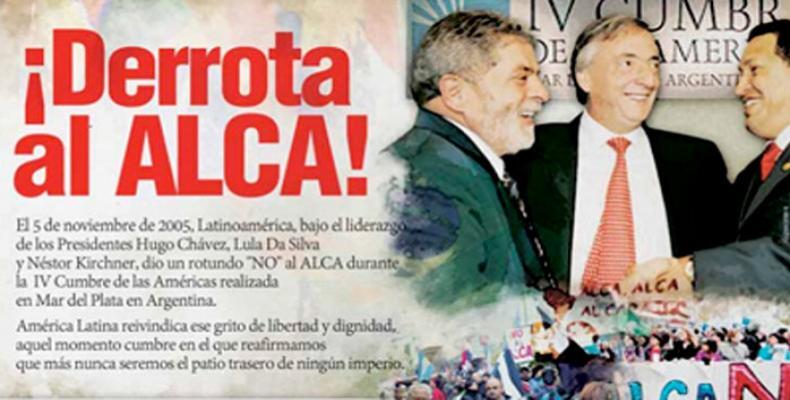
This week marked the fifteenth anniversary of the day that a group of countries in our region overturned a project of the United States government, aimed at shackling the economy and leaving the future of these people entirely to the whims of Washington.
In 2005, the IV Summit of the Americas was held in Argentina -- the scenario chosen by the occupant of the White House at that time, George W. Bush, together with his unconditional allies -- to offer a poisoned apple.
It was, as many will remember, about the Free Trade Area of the Americas, FTAA, where there was anything but freedom and trade. George W. Bush hoped that the meeting would adopt a resolution approving his project, but he ran into stiff opposition from the host, Nestor Kirchner, backed by Luis Inacio Lula da Silva from Brazil and Commander Hugo Chávez from Venezuela.
The first words of the Argentinen head of state were direct and clear and began with a very popular term, "patotear", to rile up, to cause someone or some group to become particularly excited and animated, especially in an angry or irritated manner, and this was straightforwardly addressed to his American counterpart. So he said: "Riling up" with a simple majority, ideas that have so much to do with the life of our peoples, helps very little to the coexistence of the peoples."
On November 4 and 5, 2005, Bush learned that the balance of power in Latin America and the Caribbean had changed, and a new reality was being created -- different from the one he imagined from his oval office.
The FTAA project failed because the accord had to be agreed to by consensus. And nothing could be further from the truth. This is what Chávez said during the Alternative Summit, when he affirmed that this initiative had been destroyed by the peoples of the region.
Then came the Union of South American Nations, Venezuela's membership in MERCOSUR, the Bolivarian Alliance for the Peoples of Our America (ALBA) and, and the Community of Latin American and Caribbean States.
There also came the great revenge of the empire. Oscar Laborde, president of PARLASUR (MERCOSUR Parliament) reminds us that it consisted of four stages: the creation of alternatives to regional integration such as the Pacific Alliance, dismembering MERCOSUR, harassing the three progressive pillars of the moment -- Argentina, Brazil and Venezuela -- and creating a new right wing.
A fierce persecution of political leaders whose image was intended to be destroyed through false judicial processes began, and it seemed that a dark layer had been set all over our region.
However, things became clearer in the period ahead. Cuba, Venezuela and Nicaragua resisted, Mexico changed its course, Bolivia regained its sovereignty and in Chile there were conditions to bury Pinochetism.
The dark tunnel was long, but now the light shines at the end.

